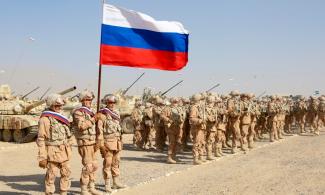
Berrier did add however that the estimate was considered "low confidence" because it was put together using a combination of intelligence sources and open source data.
Between 2,000 and 4,000 Russian soldiers are estimated to have been killed in Moscow's nearly two-week-old invasion of Ukraine.
The US Defense Department told lawmakers on Tuesday.

AFP reports that the assessment came as US defense and intelligence leaders painted a stark picture of an aggressive and aggrieved Russian President Vladimir Putin and a likelihood that he would continue to propagate a full-scale invasion of neighboring Ukraine in the face of massive global opposition.
Lieutenant General Scott Berrier, director of the Pentagon's Defense Intelligence Agency, said "somewhere between two (thousand) and 4,000," when asked at a House Intelligence Committee hearing how many Russian troops have died to date in the military operation.
Berrier did add however that the estimate was considered "low confidence" because it was put together using a combination of intelligence sources and open source data.
According to the report, Russia, in a rare release of military death figures, said on March 2 that 498 of its soldiers have died. Ukraine at the time said it believed the figure was higher.
Central Intelligence Director William Burns told the House panel that he believes Ukraine anad the Moscow-driven war is a matter of "deep personal conviction" for Putin.
"He's been stewing in a combustible combination of grievance and ambition," Burns said, adding he expects "an ugly next few weeks in which (Putin) doubles down" in Ukraine "with scant regard for civilian casualties."
He also expressed confidence that the Ukrainians will continue "to resist fiercely and effectively."
The Director of National Intelligence, Avril Haines, told the lawmakers that Putin did not anticipate the full scope of the global economic, trade and diplomatic pushback against Russia.
But she also said it was DNI's assessment that Putin is "unlikely to be deterred from such setbacks," and sees the conflict as "a war he cannot afford to lose."